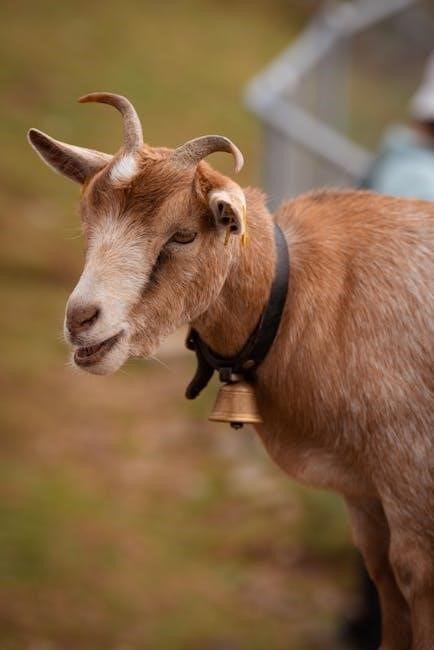This PDF summary provides a concise overview of George Orwell’s Animal Farm, detailing its plot, themes, and character analysis for easy understanding and study.
1.1 Overview of the Novel
Animal Farm, written by George Orwell, is a timeless allegorical novel published in 1945. Set on Manor Farm in England, it narrates the story of a group of animals who rebel against their oppressive owner, Mr. Jones. Led by pigs Snowball and Napoleon, the animals establish their own government, exploring themes of power, corruption, and the dangers of totalitarianism. The novel serves as a critique of the Russian Revolution and its aftermath, offering profound insights into human nature and societal structures.
1.2 Importance of the Summary PDF
The Animal Farm Summary PDF is a valuable resource for readers, offering a concise and organized overview of the novel’s key themes, plot points, and character development. It serves as an essential study guide, enabling students to grasp the story’s essence quickly. The PDF format allows for easy access and reference, making it a convenient tool for understanding Orwell’s critique of totalitarianism and the timeless lessons embedded in the narrative.
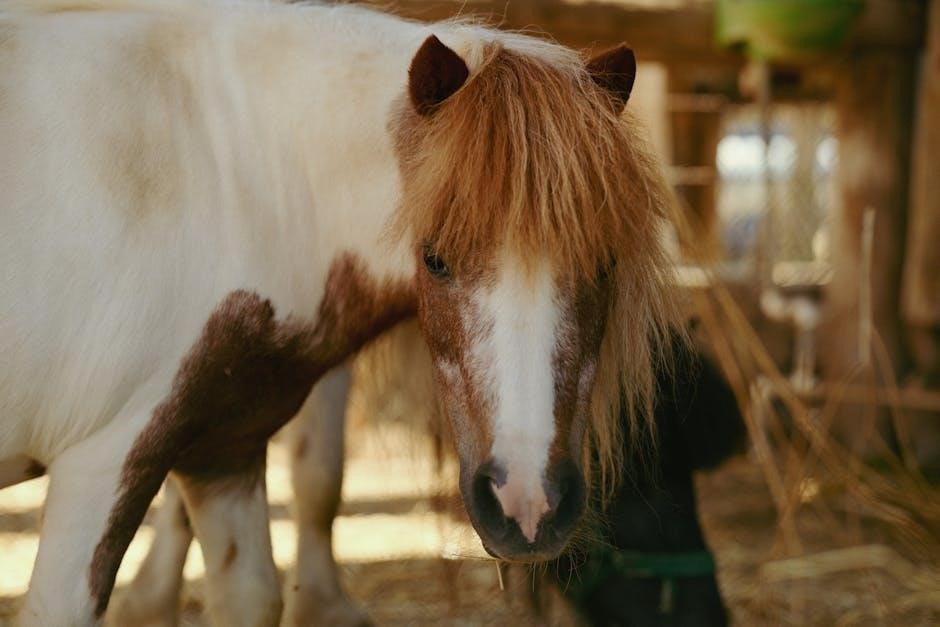
Plot Summary of Animal Farm
The novel recounts the story of Manor Farm’s animals, led by Old Major, who rebel against Mr. Jones, establishing a new society called Animal Farm. However, the pigs gradually corrupt the ideals, leading to a tragic descent into tyranny under Napoleon’s rule.
2.1 Setting: Manor Farm in England
The story unfolds at Manor Farm, a small, rundown farm in England, owned by the neglectful and often drunken Mr. Jones. This rural setting serves as the backdrop for the animals’ rebellion and their attempts to create a utopian society. The farm’s transformation from Manor Farm to Animal Farm symbolizes the animals’ fight for freedom and equality, while its eventual reversion reflects the corruption of their ideals. The setting mirrors the broader societal struggles of the time.

2.2 Key Events: Rebellion and Renaming the Farm
Driven by their suffering under Mr. Jones, the animals, inspired by Old Major’s vision, rebel and overthrow him. They rename the farm “Animal Farm,” symbolizing their newfound freedom and unity. The rebellion sparks hope for a better future, with the animals initially working together to maintain their independence. This pivotal event sets the stage for the farm’s transformation and the challenges that follow, as the animals strive to create a self-sufficient society free from human oppression.
2.3 The Rise of Napoleon and Snowball
Napoleon and Snowball, two intelligent pigs, emerge as leaders following Old Major’s death. They organize the rebellion, with Snowball focusing on strategy and Napoleon on strength. Their differing ideologies spark tension, but they unite to overthrow Mr. Jones. After the rebellion, they rename the farm and establish a new order, with the pigs assuming leadership roles. Their rivalry, however, foreshadows future conflicts and the gradual corruption of their ideals. The power dynamic between them sets the stage for the farm’s evolving political landscape.
Characters in Animal Farm
The novel features dynamic characters like Old Major, Napoleon, Snowball, Boxer, and Squealer, each representing distinct roles and ideologies, shaping the story’s political and moral themes.
3.1 Old Major: The Visionary
Old Major, a wise and aged boar, serves as the catalyst for the rebellion. In his pivotal speech, he shares his vision of Animalism, advocating for a society where animals can live free from human oppression. His philosophy inspires the animals to unite and rebel against Mr. Jones, setting the stage for the transformation of Manor Farm into Animal Farm. His death shortly after solidifies his legacy as a symbolic leader.
3.2 Napoleon and Snowball: Leaders of the Rebellion
Napoleon and Snowball, two intelligent pigs, emerge as leaders after Old Major’s death. They champion the cause of Animalism, guiding the rebellion against Mr. Jones. Their leadership, however, is marked by ideological differences; Napoleon favors a pragmatic approach, while Snowball advocates for more idealistic policies. Their rivalry intensifies, ultimately leading to Napoleon’s expulsion of Snowball, establishing Napoleon as the sole leader of Animal Farm.
3.3 Boxer: The Loyal and Hardworking Horse
Boxer, a strong and dedicated horse, becomes a symbol of loyalty and hard work on Animal Farm. His famous motto, “I will work harder,” reflects his commitment to the farm’s success. Despite his physical exhaustion and eventual betrayal by Napoleon, Boxer remains steadfast in his devotion to the rebellion’s ideals. His tragic fate underscores the exploitation of loyal individuals under totalitarian regimes, leaving a lasting impact on the narrative.
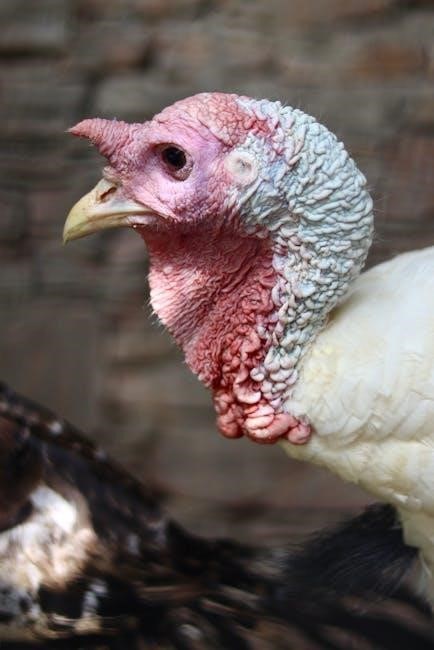
Themes in Animal Farm
Orwell explores totalitarianism, corruption, and the betrayal of ideals through the animals’ struggle, highlighting how power corrupts and propaganda manipulates truth, ultimately leading to lost freedom.
4.1 Totalitarianism and Corruption of Power
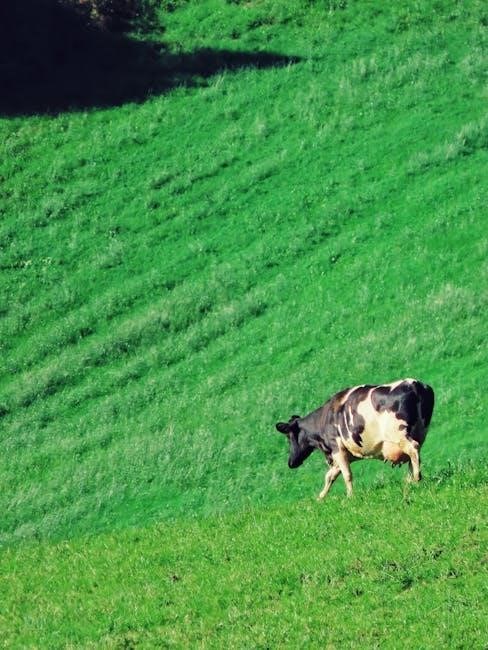
Napoleon’s rise mirrors Stalin’s totalitarian rule, showcasing how power corrupts. The pigs exploit their position, manipulating rules and propaganda to maintain control, ultimately betraying the rebellion’s ideals and reducing the animals to oppression, indistinguishable from their former human oppressors.
4.2 Betrayal of Ideals and the Decline of Rebellion
The rebellion’s initial aim of equality fades as the pigs prioritize power over unity. Snowball’s expulsion and Napoleon’s authoritarian rule mark the decline, with the Seven Commandments altered to justify exploitation. The animals’ hope for freedom crumbles, revealing how revolutions can falter when leaders abandon original ideals for personal gain and control, leaving the farm in a state of disillusionment and defeat.
4.3 Propaganda and Manipulation
Propaganda plays a pivotal role in manipulating the animals’ perceptions. Squealer, Napoleon’s propagandist, distorts facts and rewrites history to justify the pigs’ actions. The alteration of the Seven Commandments and the glorification of Napoleon’s leadership illustrate how propaganda is used to maintain power and control. This manipulation ensures the animals remain loyal, unaware of the corruption unfolding around them, highlighting the dangers of misinformation and the erosion of truth in totalitarian regimes.
Symbolism in Animal Farm
The farm symbolizes society, while the pigs represent corrupt leaders. The Seven Commandments and their alteration reflect the manipulation of power and ideals.
5.1 The Farm as a Symbol of Society
The farm symbolizes society, with Manor Farm representing a microcosm of human inequality and corruption. The animals’ rebellion and subsequent power struggles mirror real-world societal dynamics, highlighting Orwell’s critique of totalitarian regimes and the exploitation of power. The farm’s transformation reflects broader societal changes, emphasizing themes of corruption and the decline of idealistic movements.
5.2 The Pigs and Their Representation
The pigs, particularly Napoleon and Snowball, symbolize the corrupting influence of power and leadership. Initially idealistic, they gradually abuse their authority, mirroring totalitarian regimes. Their manipulation of the farm’s commandments and exploitation of other animals highlight Orwell’s critique of power and its potential for corruption, reflecting historical parallels with figures like Stalin and Trotsky.
5.3 The Commandments and Their Alteration
The Seven Commandments, initially crafted to guide the animals’ new society, are repeatedly altered by Napoleon. This manipulation reflects the corruption of original ideals, as the pigs justify their actions by rewriting the rules. The final alteration, “All Animals Are Equal / But Some Animals Are More Equal Than Others,” symbolizes the complete erosion of equality and the rise of totalitarian control, highlighting Orwell’s critique of power and its misuse.
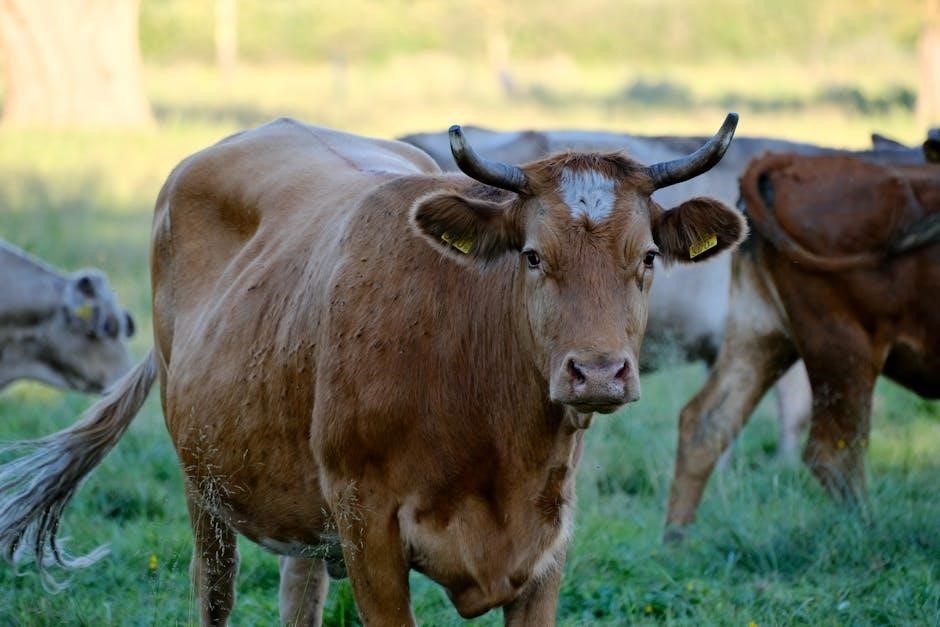
Chapter-wise Summary
The PDF summary breaks down each chapter, detailing the rebellion’s origins in Chapter 1 and its tragic conclusion in Chapter 9, highlighting key events and character roles.
Chapter 1 introduces Manor Farm, owned by the neglectful Mr. Jones, and the discontent among the animals. Old Major, a wise boar, gathers them to share his vision of a utopian society without humans. His speech inspires rebellion, setting the stage for the animals’ collective action against their oppressive conditions and sparking the desire for freedom and equality that drives the narrative forward.
6.2 Chapter 9: The Final Collapse of the Rebellion
Chapter 9 marks the end of the rebellion as the pigs, now fully corrupted by power, complete their transformation into oppressive rulers. The Seven Commandments are reduced to a single phrase, and the pigs, indistinguishable from humans, rename the farm Manor Farm. The animals, exhausted and disillusioned, realize their ideals of equality and freedom have been utterly betrayed, leaving them trapped in a cycle of exploitation and despair.
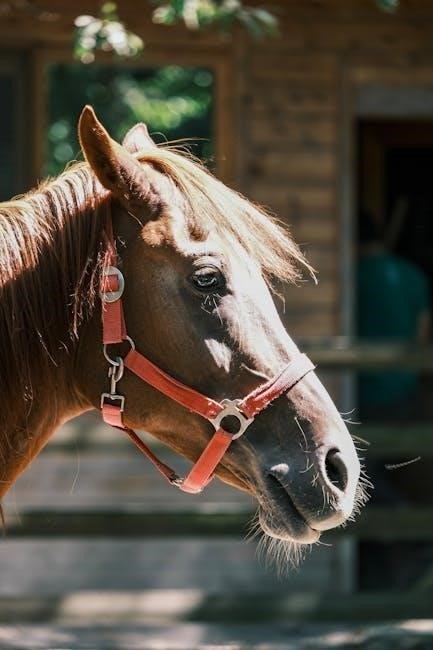
Historical Context
Animal Farm, published in 1945, reflects the events of the Russian Revolution and the rise of Stalinism, offering a critique of totalitarianism through its allegorical narrative.
7.1 The Russian Revolution and Its Parallels
Orwell’s Animal Farm mirrors the Russian Revolution, with the animal rebellion symbolizing the overthrow of the tsar. Old Major represents Marx, while Napoleon and Snowball embody Stalin and Trotsky. The pigs’ gradual corruption reflects the Soviet leaders’ descent into authoritarianism, highlighting Orwell’s critique of totalitarianism and its betrayal of revolutionary ideals. The novel serves as a timeless allegory for the dangers of power consolidation and ideological manipulation.
7.2 Stalinism and the Rise of Totalitarianism
Napoleon’s rise in Animal Farm parallels Stalin’s consolidation of power in the Soviet Union. Orwell critiques Stalinism through Napoleon’s manipulation, propaganda, and suppression of dissent. The pigs’ alteration of the Seven Commandments reflects Stalin’s distortion of revolutionary ideals, emphasizing the dangers of unchecked power and totalitarian control. This mirrors the Soviet regime’s erosion of freedom and equality, highlighting Orwell’s warning against authoritarianism and its corrupting influence on revolutionary movements.
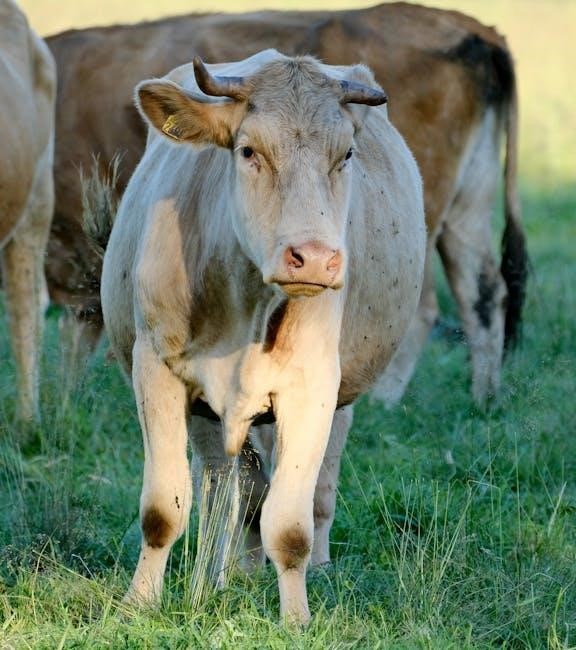
Moral and Ethical Questions
The novel raises profound moral dilemmas, questioning the cost of rebellion, the ethics of power, and the consequences of betrayal, highlighting corruption’s destructive nature.
8.1 The Cost of Rebellion and Freedom
The novel explores the moral implications of rebellion, revealing how the pursuit of freedom often leads to unintended consequences. The animals’ initial hope for equality and liberation devolves into a system mirroring the oppression they sought to escape. This highlights the ethical dilemma of whether rebellion, in itself, guarantees true freedom or merely replaces one form of tyranny with another.
8.2 The Role of Power and Corruption
The novel illustrates how power inevitably corrupts, as the pigs, initially leaders of the rebellion, gradually abuse their authority. Napoleon and Snowball’s struggle for dominance exemplifies the dangers of unchecked power, leading to exploitation and manipulation of the other animals. The pigs’ corruption mirrors human totalitarian regimes, highlighting the ethical question of whether power inherently leads to abuse, undermining the ideals of equality and justice the rebellion initially sought to achieve.
Writing Style and Literary Devices
Orwell employs allegory and satire to critique totalitarianism, using simple yet powerful language. His irony and symbolism, like the pigs’ corruption, deepen the novel’s political commentary.
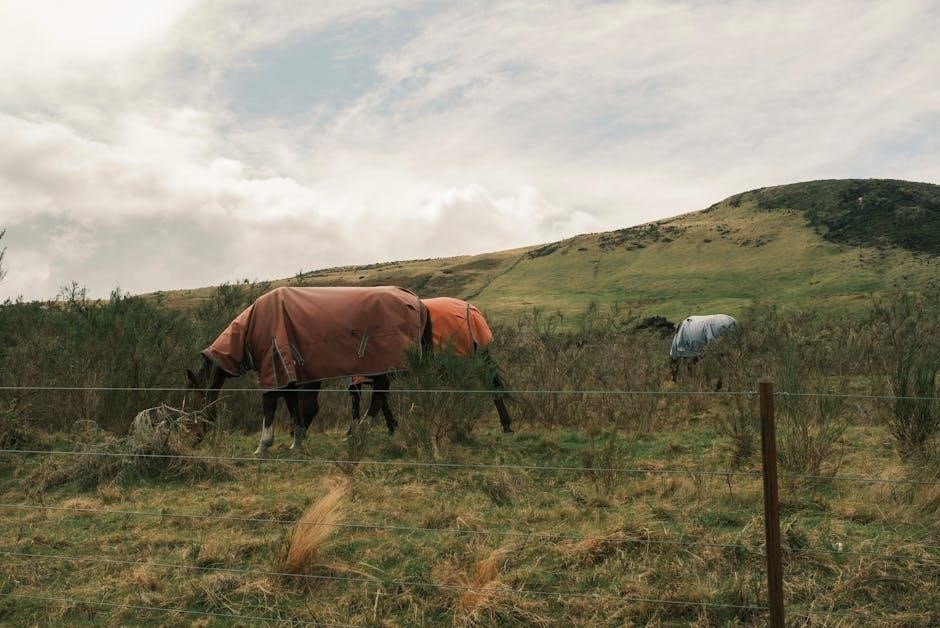
9.1 Allegory and Satire in the Novel
Orwell masterfully blends allegory and satire in Animal Farm, transforming historical events into a fable. The pigs symbolize Soviet leaders, while the farm represents Russia, critique Stalinism. Satire mocks totalitarianism, highlighting corruption. Through this blend, Orwell delivers sharp political commentary, making the novel timeless and thought-provoking, offering insights into power dynamics and societal manipulation with clarity and wit.
9.2 Orwell’s Use of Irony and Symbolism
Orwell employs irony and symbolism to convey deeper meanings in Animal Farm. The pigs’ gradual embrace of human traits, like walking on two legs, ironically undercuts their initial ideals. Symbols such as the farm itself, representing society, and the altered commandments, reflecting corruption, reinforce the novel’s critique of totalitarianism. Orwell’s subtle yet powerful use of these literary devices enhances the story’s depth and universal relevance, making it a compelling commentary on power and manipulation.
Impact and Legacy
Animal Farm remains a powerful critique of totalitarianism, influencing political discourse and literature worldwide. Its timeless themes of power and corruption ensure continued relevance and study.
10.1 Censorship and Controversy
Animal Farm faced censorship due to its critique of Stalinism, banned in the USSR and initially restricted in Western countries. Its controversial themes led to challenges in schools, with some viewing it as subversive. Despite this, the novel’s popularity grew, becoming a symbol of free speech. Orwell’s original preface on censorship was omitted, further highlighting the book’s contentious reception and enduring relevance in political discourse.
10.2 The Novel’s Relevance Today
Animal Farm remains relevant today, offering timeless lessons on power, corruption, and the dangers of authoritarianism. Its themes resonate in modern political climates, making it a vital read for understanding historical and contemporary issues. The PDF summary highlights how Orwell’s allegory continues to inspire critical thinking about governance, propaganda, and the erosion of ideals, ensuring its enduring impact on readers worldwide.
Resources for Further Study
Download Animal Farm PDF summaries, study guides, and analysis from platforms like Litres. Audiobooks and online resources provide deeper insights into Orwell’s timeless allegory.
11.1 Where to Download the PDF Summary
11.2 Recommended Study Guides and Analysis
For deeper insights, explore study guides like SparkNotes and LitCharts, which offer detailed character and theme analyses. Websites such as Bookey provide concise summaries, while platforms like Scribd and Google Play Books host downloadable PDF guides; These resources enhance understanding of Orwell’s allegory, exploring themes like totalitarianism and the corruption of power, ensuring a comprehensive analysis of Animal Farm.
The Animal Farm Summary PDF offers a concise yet comprehensive overview of Orwell’s timeless allegory, making it an invaluable resource for understanding the novel’s themes and significance.
12.1 Final Thoughts on the Summary
The Animal Farm Summary PDF effectively captures the essence of Orwell’s allegory, providing a clear and structured overview of the novel’s plot, themes, and characters. It serves as a handy resource for students and readers, offering insights into the timeless themes of power, corruption, and betrayal. The summary retains the original message of the novel while presenting it in an accessible format, making it an invaluable tool for understanding Orwell’s masterpiece.
12.2 Encouragement for Further Reading
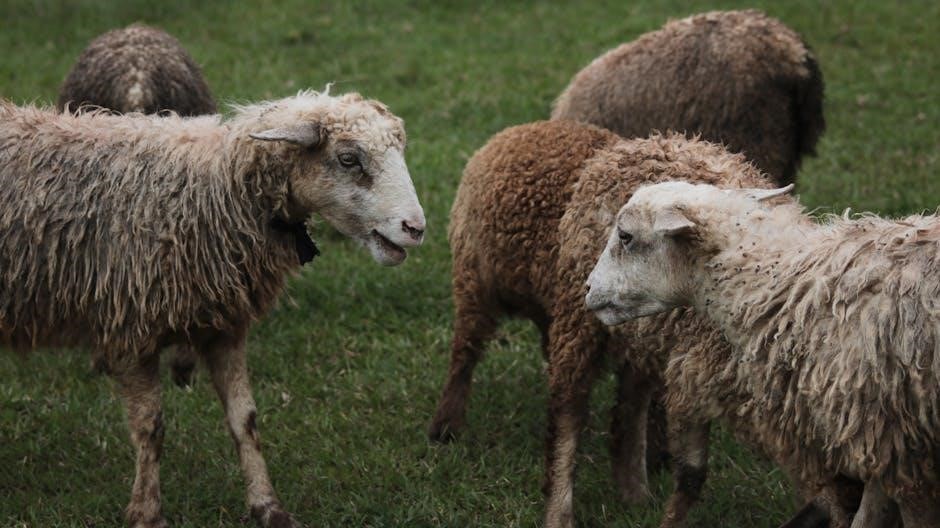
While the Animal Farm Summary PDF offers a concise and insightful overview of George Orwell’s classic novel, it only scratches the surface of the rich themes and complexities present in the full text. Reading the complete book allows for a deeper exploration of the characters, their motivations, and the societal commentary Orwell masterfully weaves throughout the story. Engaging with the original work enhances your understanding and appreciation of this timeless allegory.

